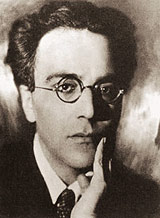
A couple of days ago, Muireann Maguire — a Senior Lecturer in Russian at Exeter, who, in her spare time (ha!), blogs wittily at the Russian Dinosaur — wrote to me about her plans to translate the prose of Georgy Shengeli (1894-1956), who is remembered mostly, if at all, as a poet. Shengeli is far from a household name in Russia today, but he was highly regarded by the writers of his generation. Unfortunately, his career as a poet and verse theorist took a bad turn in 1927, when he published a booklet criticizing Mayakovsky, who was by then the most powerful poet in the Soviet Union. A polemic ensued, from which Shengeli did not emerge unscathed; he withdrew into translation, editing, and teaching. In the 1930s he headed the “Literatures of the Peoples of the USSR” division of the State Publishing House, commissioning translations from colleagues like Osip Mandelstam and Anna Akhmatova, who were unable to publish their own verse. In 1939 he took up a professorship at the Maxim Gorky Literature Institute in Moscow, but it appears he didn’t like the work; he saw many of his students as careerists, who set little store by the poetic tradition to which he had dedicated his entire life. In one of his last poems, written in 1955, Shengeli casts a wistful backward glance at the great flowering of poetic culture he had witnessed in his youth. The names in the poem belong to Andrey Bely, Valery Bryusov, Konstantin Balmont, Osip Mandelstam, Boris Pasternak, Maximilian Voloshin, Igor Severyanin, Ivan Bunin, Anna Akhmatova, Sergey Yesenin, Vladimir Narbut (certainly not Vladimir Mayakovsky!), Vyacheslav Ivanov, Marina Tsvetaeva, and Alexander Blok.
He knew them all, saw nearly all of them:
Andrey, Valery, Konstantin,
Osip, and Boris, Maximilian,
Igor, Ivan, Anna, Sergei,
Vladimir, Vyacheslav, Marina,
Alexander — an unrivaled chorus,
a stellar constellation of fourteen.
That fireworks display of names!
How history would cheer their victory!
Was this not Peter’s triumph? Not the coming
of the Third Rome? The feast
to celebrate the marriage of the West
with Russia’s boundless, all-embracing soul?
He knew them all. He spoke of them
to his ungrateful students, and they listened
respectfully, weighing their options:
How much demand is there today for star shine?
A safer bet would be the dullness of a hymn
or anthem made to order.
And he fell silent. Keeping to himself
his memories of the marvelous constellation,
which would remain unique forever…
He was old
and sad, like the last gun of a salute.
Shengeli is also one of the subjects in Lev Ozerov’s Portraits Without Frames. The poem, beautifully translated by Maria Bloshteyn, begins:
In the narrow hallway Akhmatova
repeated what she had said
in the room an hour earlier:
“Do something for Shengeli,
don’t forget about him,
please reread his poems…”
Shengeli isn’t forgotten. I myself will try to “do something” for his poems, and thanks to Muireann, anglophone readers will soon be able to discover his prose as well.
“He was old
and sad, like the last gun of a salute.”
That’s a very moving end to the poem!
LikeLiked by 1 person
I agree, Maya… A very effective diminution…
LikeLike
Oh wonderful! A poet new to me too, so I’ll look out for what appears. I loved this part particularly:
“How much demand is there today for star shine?
A safer bet would be the dullness of a hymn
or anthem made to order.”
That list of names was most definitely some of the shining stars of Russian writing.
LikeLiked by 1 person
Kaggsy, yes, those are wonderful lines, and quite damning… I should also note that, in earlier years, Shengeli had taught genuine stars, such as Arseny Tarkovsky and Maria Petrovykh.
LikeLiked by 1 person
[…] and (this being Odessa) chicanery, as well as home to a succession of lighthouses. Its author is Georgy Shengeli, who spent the Civil War years in the region and composed this on November 10, […]
LikeLike